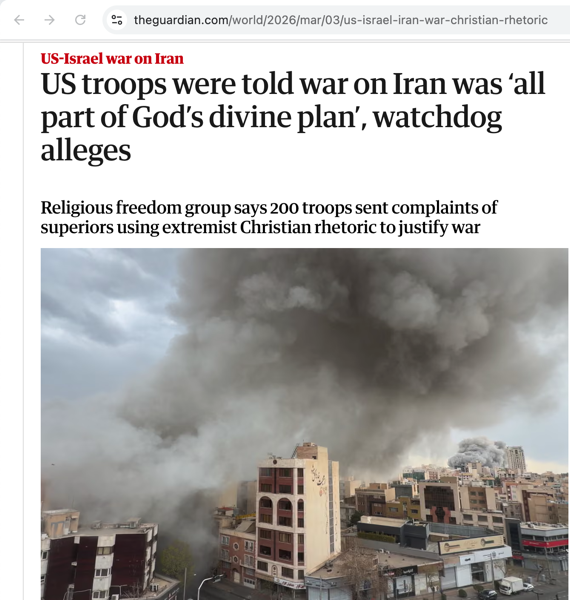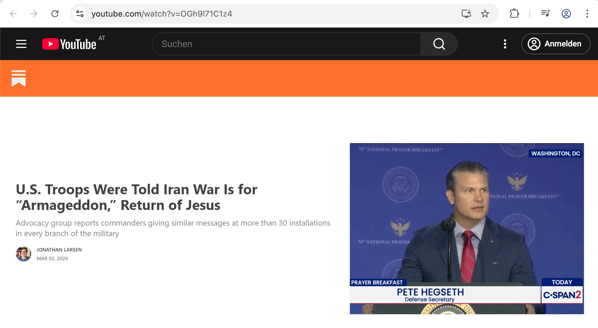
src: click (The Guardian)
Earlier source:

src: click
Hätte ich nicht angegriffen, hätten sie in einem (zwei?) Monat die Bombe gehabt.
Wenn wir ihnen den Donbas geben, nehmen sie sich morgen Kiew!
Da hätten sich nicht zwei größere Arschlöcher treffen können.
Postulier ich mal.
Sie tuns ja auch.
edit: Wie, nein - Regimechange? Wir? Nein, das is kein Ziel mehr - wir müssen nur noch kurz, …
Irans Regime droht, das „Tor zur Hölle zu öffnen“. Es setzt auf einen asymmetrischen Abnutzungskrieg. Israels Luftwaffe nimmt Treffen des iranischen Expertenrats ins Visier.
src: click
Damit die keinen neuen religiösen Führer wählen!
- wie muss man sich das geografisch vorstellen?
Gerald Karner: “Der Iran liegt im Prinzip eigentlich im Zentrum des mittleren Ostens, …”
Ich mag nimma mehr…
Ich link nicht mal mehr. Solln sie verrecken.
- von drei Shaheeds, aber Schweden und Finnland nicht.
Dass daraufhin Zypern von britischen Militärflughäfen mittels US Flugzeugen verteidigt werden wird, indem die im Iran DEFENSIV Angriffswaffen zerstören.
Aber Zypern immer noch nen scheiss seine Neutralität aufgeben, oder in die Nato will?!
WANN!
JEDEN TAG DEN DIE DEUTSCHSPRACHIGEN QUALITÄTSMEDIEN NICHT DARÜBER BERICHTEN IST ZYPERN SCHUTZLOS SHAHEED ATTACKEN AUSGELIEFERT.
Lol.
Achja, ne - das UK Militär brauchte nur nen Vorwand..
Da haben wir von der Alpach Elite nicht zuende gedacht, was des mit unseren restlichen Narrativen macht.
Gut scheiss drauf.
In Finnland wars ne Massenpsychose induziert durch die jetsettende Polit-Jugend, in Schweden die Luftfahrts Militär Produzenten Abkommen mit den US (Lobbyarbeit).
Oder der Russe der in beiden Fällen nicht mehr kommt, weil dieser heldenhafte Schritt getätigt wurde --
nur in Zypern fängt keiner die verfickte Scheindebatte an.
Denkt den keiner an Zypern?! Ich mein, das ist EU Mitglied.
Die armen Zyprioten, und erst ihre Kinder!!! Denkt den keiner an die Kinder!

src: click
Was war passiert? Iran hat US Militärbasen in Zypern angegriffen (BS?). Stamer hat geleakt, dass die Ukraine Drohnenexperten bereit stellt.
Und Selenskyj hat politisch Frischluft gewittert.
Heeeeellllls Yeah!
Isch geb dir Experte.
Isch krieg Termin für Beitrittsgespräche, ja?
EU-Beistandsverpflichtung in Artikel 42 Absatz 7 des Vertrags über die Europäische Union (EUV) FTW!
edit: Es gibt aber natürlich auch wieder gute Nachrichten, der Standard zum Beispiel versorgt uns heute wieder mit einem Fehlersuchtext!
Stocker zu Straße von Hormus
Österreich hat laut Bundeskanzler Stocker vorgesorgt. Man sei weder wirtschafts- noch energiepolitisch vom Iran abhängig. Derzeit seien durch Probleme auf der Handelsroute auf der wirtschaftlich wichtigen Meerenge, der Straße von Hormus, keine Auswirkungen auf Österreichs Energieversorgung zu erwarten, so Stocker. Eine Taskforce mit dem Namen “Versorgungssicherheit” wurde laut Stocker eingerichtet.
src: click
Also ich fass noch mal zusammen, Stocker zur Straße von Hormusz: “Wir haben keine Abhängigkeit vom Iran”.
Auswirkungen auf die Energieversorgung sind keine zu erwarten, die Taskforce haben wir bereits gegründet.
KLLLLOOOOOAAAAAR.
Ich mein 50% der Energieimporte von China, 70% in Südkorea, 90% in Japan und weniger von Indien, und Australien gehen über die Straße von Hormuz.
Eine Meldung für die Verfickte scheiss Mizitant.
